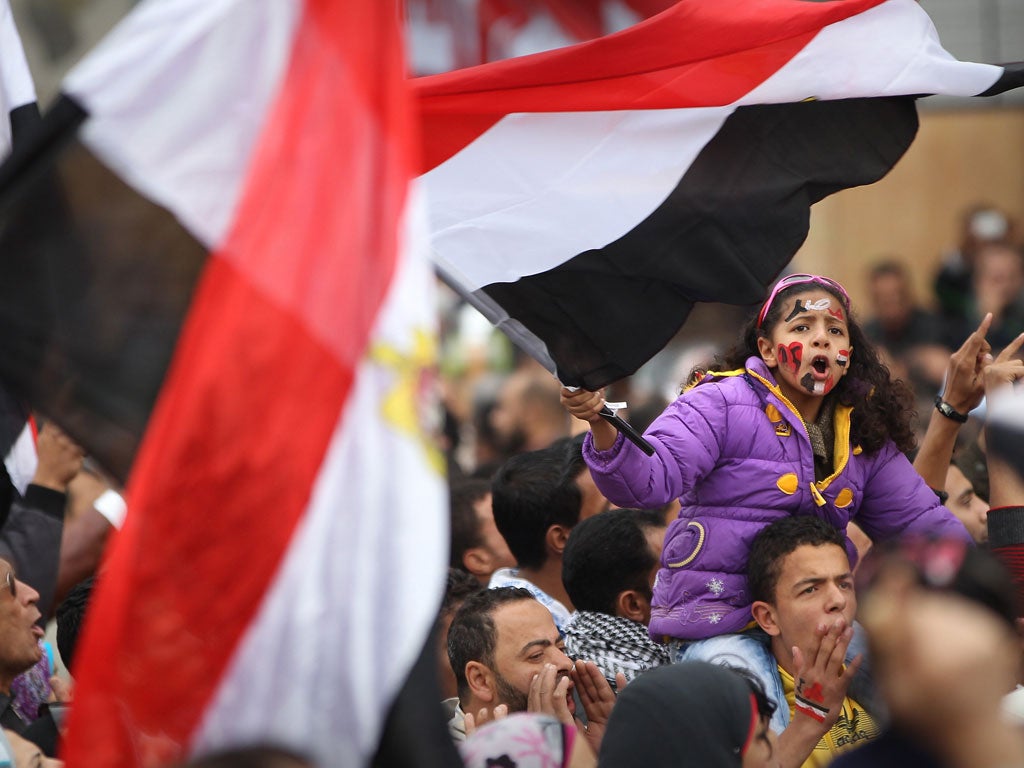Tantawi defies Tahrir's crowds on eve of election
Military Council head says he will not allow 'troublemakers' to meddle in the process

As the first heavy rainfall in months bucketed down on Tahrir Square last night, at least one figure remained unmoved. The statue of Umar Makram, an Egyptian folk hero who helped vanquish a British attempt to seize Alexandria more than 200 years ago, stood stoically under the lamplight in the Square's western corner as hundreds of activists scurried for shelter. "Rain in our country is traditionally a good thing," said Ashraf Aglan, an activist whose tent sits 20 yards behind the statue. "We had rain during the revolution and we kept on going."
It would be churlish to doubt his determination, particularly given the number of other demonstrators who are still camped out alongside him.
With voting today in the first round of landmark parliamentary elections, protesters in Cairo are calling for the ruling Military Council to step aside immediately in favour of an interim civilian government, setting up a political standoff which could yet derail the country's emergence from decades of dictatorship.
Over the weekend, Mohamed el-Baradei, the Nobel Peace Prize laureate and a presidential candidate, offered to relinquish his bid for Egypt's top job in order to assume leadership of the interim council – a proposal backed by numerous political coalitions.
But Field Marshal Hussein Tantawi, the chief of the Military Council which took power in February after the overthrow of Hosni Mubarak, yesterday rejected calls to step down. Instead he warned of "extremely grave" consequences if the unrest in Cairo was allowed to continue, blaming "foreign hands" for being behind the clashes.
"Hosni Mubarak used to say the same things," said Maha Maamoun, a member of the No to Military Trials activist group. "It's a very confusing situation."
Mr Tantawi's warning came as tens of thousands of protesters again packed Tahrir Square yesterday in a final effort to topple Egypt's generals. It was the ninth day of protests including nearly a week of violent nationwide unrest in which 41 civilians have died.
But Mr Tantawi appeared intent on isolating the demonstrators in Tahrir Square, saying the government would "not allow troublemakers to meddle in the elections".
Previous statements have sought to portray the rallies as unrepresentative, with the generals perhaps hoping that the so-called Party of the Couch – the name given to those Egyptians sitting at home watching the protests on television – will come down on their side.
Professor Paul Sullivan, an expert on the Egyptian military, said: "As much as the Tahrir protesters would like to see the Military Council leave, until they and others can come up with an alternative that makes sense it is important that there be some backbone to the country."
Islamists have also taken umbrage at the "El-Baradei option". The Muslim Brotherhood, widely expected to be the big winner of the elections, has eschewed the recent demonstrations and is unwilling to rock the boat so close to achieving power.
Shady al-Ghazaly Harb, a member of the Revolution Youth Coalition, said the Military Council had now "got the message" that the protesters in Cairo would not be leaving until their demand for a civilian council was met.
But if that is true, Mr Tantawi and his acolytes appear happy to ignore the message.
If both sides read their history they would know that almost 60 years ago to the month, Egypt's capital was decimated in the so-called "Cairo fire". Rioters torched hundreds of buildings in a rampage through the centre of the city, paving the way for the revolutionary regime of Gamal Abdel Nasser.
Six decades on, many are wondering how the political dust will settle after this latest chain of violence.
Join our commenting forum
Join thought-provoking conversations, follow other Independent readers and see their replies
Comments
Bookmark popover
Removed from bookmarks